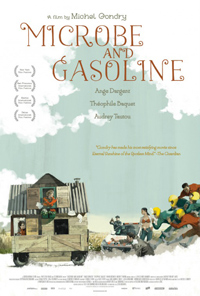Boys of Summer: Gondry Dials Down the Mayhem for Gentle Road Film
 If Michel Gondry’s latest film Microbe and Gasoline can potentially be regarded as the director’s slightest effort to date, it also bears the marks of an auteur who has learned to harness certain overriding signature flourishes which sometimes strangle his subjects. Ever since the prolific music video director scored runaway success with his 2004 sophomore film Eternal Sunshine of the Spotless Mind, he’s a filmmaker who isn’t often given credit for usurping his own standards. Idiosyncratic flourishes once cherished have since lapsed into oft derided hipster ether, and his usually romantically troubled characters struggle to outshine their more colorful set-pieces (a problem significantly hampering items like The Science of Sleep and Mood Indigo). Having left behind the booby trap of Hollywood (2011’s The Green Hornet), his return to French language has yielded interesting, if not always celebrated results. This latest is a youth portrait road movie concerned with two young boys at the cusp of adolescence, misfits at home and at school, who take off on their own inspired adventure by crafting a motorized house on wheels and driving through the countryside.
If Michel Gondry’s latest film Microbe and Gasoline can potentially be regarded as the director’s slightest effort to date, it also bears the marks of an auteur who has learned to harness certain overriding signature flourishes which sometimes strangle his subjects. Ever since the prolific music video director scored runaway success with his 2004 sophomore film Eternal Sunshine of the Spotless Mind, he’s a filmmaker who isn’t often given credit for usurping his own standards. Idiosyncratic flourishes once cherished have since lapsed into oft derided hipster ether, and his usually romantically troubled characters struggle to outshine their more colorful set-pieces (a problem significantly hampering items like The Science of Sleep and Mood Indigo). Having left behind the booby trap of Hollywood (2011’s The Green Hornet), his return to French language has yielded interesting, if not always celebrated results. This latest is a youth portrait road movie concerned with two young boys at the cusp of adolescence, misfits at home and at school, who take off on their own inspired adventure by crafting a motorized house on wheels and driving through the countryside.
Daniel (Ange Dargent) is small for his age, and his androgynous appearance often has distracted adults confusing his gender. Amongst his peers and even loved ones, his stature earns him the nickname Microbe, but this affords him a certain proximity to his crush, Laura (Diane Besnier), who regards him affably as an outsider. When a new boy joins their class (Theophile Baquet), decked out in a leather jacket and smelling like motor oil because he assists his mechanic father, the kids jeeringly coin him Gasoline. Microbe is immediately attracted to the energy of this stranger who doesn’t seem to care what the other kids say, and the two are soon fast friends holding sleepovers and ignoring the conflict both sets of parents seem to be experiencing. With access to a scrap yard, they decide to take off on a road trip from Paris to the Burgundy countryside by building their own vehicle. In order to avoid unwarranted attention from adults, they design it as a house on wheels, and as soon as school lets out for the summer, they make their way into a haphazardly planned adventure.
Gondry captures the same sense of adolescent ungainliness as in his underrated 2012 film The We and the I, a portrait of American youths on their last day of school set entirely on a packed bus which slowly completes its Sisyphean route. Transportation, the notion of growth patterns, and transition as metaphor are elements factoring heavily into Microbe and Gasoline with its two youths designing their own ride so they may swerve off into their own destiny. While Gondry’s use of non-professional teens in his school bus feature was a glaring detraction thanks to some stiff acting, the ungainly qualities displayed by Dargent and Baquet as the titular boys are always deliberate. Likewise, they aren’t constrained by any gimmickry, such as a solo setting or by the often outlandish practical special effects packed into his films, and as such, Microbe and Gasoline is his most uncomplicated and unfettered item to date.
Melancholy and disappointment are pushed to the periphery, such as the ineffectual taunting of Gasoline by several obnoxious peers, or the school staff who dismissively refer to Microbe as a young girl thanks to his slim frame and shapeless blond mop. Both have experienced different shades of emotional dysfunction at home, with Gasoline’s working class home a junk heap of anonymity for the boys. Microbe’s home life is full of equally familiar discord (“artists bring misery and mess,” comments Gasoline’s mom), with a frowzy Audrey Tautou (reteaming with Gondry after Mood Indigo) as a distraught and distracted parent dealing with an impending divorce, haphazardly struggling to relate to her children (her sons ponder the muffled sounds coming from their parents’ bedroom, contemplating how ‘screwing’ has turned to crying).
Featuring some of Gondry’s most earthbound flights of fancy, even its most nonsensical sequences (like police stopping to take a selfie by their makeshift house) exude a warm naturalism, a gawky energy as equally charming as it is trying. Low-key drama transpires between themselves and strangers they meet along the way (including a dentist and his wife suffering from a severe case of empty nest syndrome) and trundles along to a finale as klutzy as it is pragmatic. Gondry crafts a winning antidote to similar portraits of outsider youth fashioned for US audiences, which often interrupt cinematic rhythm for cheap, insincere bids at comedic relief (i.e., The Kings of Summer, 2013).
★★★/☆☆☆☆☆


